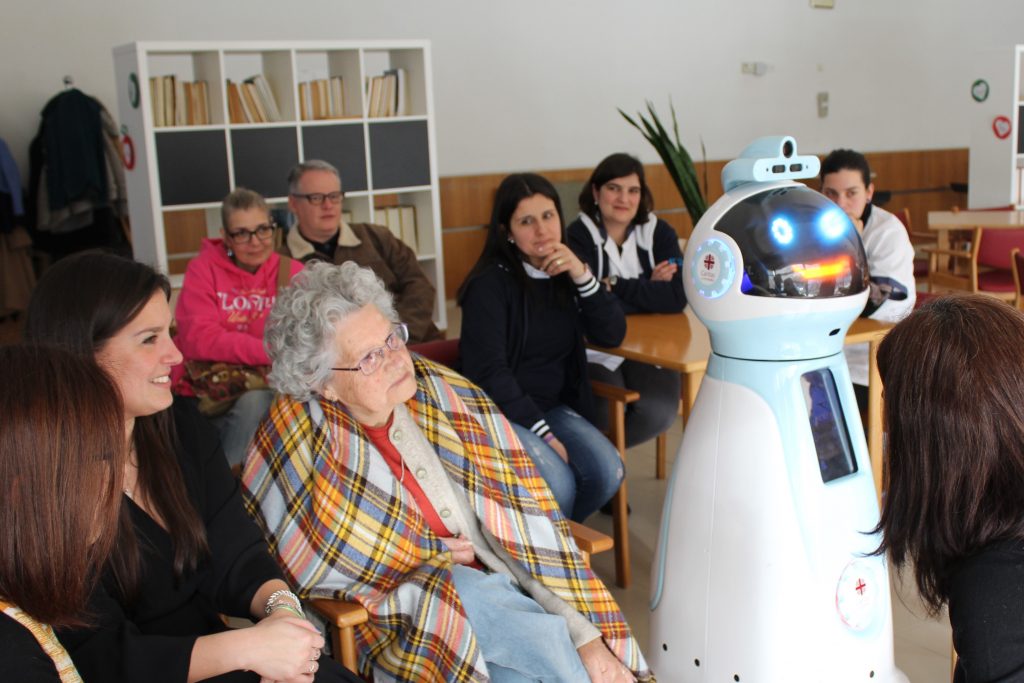Cáritas Coimbra focus on projects in the community to achieve a more inclusive society
Population ageing is a reality observed in all countries of the European Union (EU), constituting itself as a demographic phenomenon – but also a social, economic, cultural and health one – that imposes new challenges. According to Eurostat[1], in 2018, nearly one fifth of the EU population was aged 65 or more. Within the last decade, an increase of 2.6% was observed, being expected that people aged 65 or over will represent 31.3% of the EU population by 2100.
This trend brings the need to find new answers. Society must be organized to take advantage and include older people, improving their quality of life and alleviating the social isolation in which they live. Realizing this, Cáritas Coimbra, together with other orgaorganisations, has been investing in projects that involve the whole community in the ageing process. In the last few months, it has started several projects that involve not only direct/primary beneficiaries – older people – but also their formal and informal caregivers and other stakeholders such as healthcare providers, public authorities, insurance companies, researchers, citizens and civil society organizations, among others.
An example is PHArA-ON, a large-scale pilot, developed by 42 European partners, which aims to create a set of open and integrated platforms where older citizens, formal caregivers (health and social professionals), informal caregivers (family and close friends) and other community organizations can interact providing better physical, mental and well-being. VALUECARE, with a consortium of 17 entities, also intends to create a digital solution available for formal and informal caregivers, within the scope of integratedintegrated care.
Although the older citizen remains the key focus, there is a concern to involve and connect all those who have some type of influence on their daily lives. PlatformUptake.eu is also an example of this. Developed by 12 entities, it aims to identify the ecosystem of existing “open service” platforms, promoting synergies between the respective networks and related projects in the AHA and IoT domains.
These three projects are funded by the European Union’s Horizon 2020 programme. The AAL Programme and, in Portugal, the FCT – Fundação para a Ciência e a Tecnologia, co-fund the DIANA project, which is directed at nurses of people with dementia. The project is being developed by 7 entities and aims to help these health professionals to optimize their work procedures, through the use of 3D artificial intelligence sensors.
At the national level, Cáritas Coimbra is implementing the project Cons©elhos de Repórteres 55+, funded by the BPI “la Caixa” Rural 2019 programme, which involves the community at a more local level. This project demonstrates that it is also possible to integrate older citizens inin rural areas without having technology as a basis, since human contact and socialization are essential. The initiative seeks to train people aged 55 or over, living in rural areas, to survey the necessary conditions, in their locality, to improve their quality of life. The project will help these citizens to summarize their needs and proposals for improvement and present them to the competent authorities and/or mobilize possible solutions. In this way, it involves the entire community in a process of improving the quality of life of older citizens, including policy-makers. This project wants to get older people out of the house and promote social relationships and interactions, reducing the isolation in which they live and, consequently, improving their well-being (mental and physical).
Demographic ageing alone is not a social problem, but the absence/inadequacy of responses to people’s needs and the lack of articulation of these responses with civil society already are. These projects intend, in different ways, to cross the lives of the youngest and the oldest, finding solutions that can be adapted to the new realities. It is necessary to promote Smart Healthy Age-Friendly Environments. It is necessary to create conscious, inclusive, participatory, interactive and cohesive communities. For this, it is essential to adapt the health services provision, but also to invest in social relationships. Only by working in these two contexts is it possible to effectively improve the quality of life of older citizens.
An example to remember is GrowMeUp, a project recently covered in a television documentary. GrowMeUp was developed between 2015 and 2018, under Horizon 2020 programme, and aimed to develop an innovative robot that could support citizens aged 65 and over in their daily life activities, compensating the constant deterioration of the cognitive ability and ensuring the service provision and quality of life throughout the ageing process. See the documentary “La cuarta revolución – Episode 4 ″ HERE (12m14s-15m05s: GrowMeUp) – not subtitled.

[1] https://ec.europa.eu/eurostat/statistics-explained/index.php?title=Population_structure_and_ageing#The_share_of_elderly_people_continues_to_increase